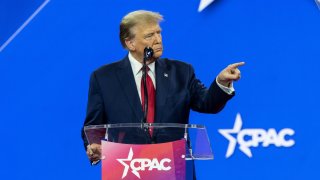The War Over Donald Trump’s Second-Term Foreign Policy Begins
Cold War II? A new pragmatism? Or “America first” isolationism? For now, O’Brien has fired the opening shot in what will likely be a protracted battle over Trump’s foreign policy.
It’s time to go back to Jackson. That is the message of former national security adviser Robert C. O’Brien (who is regularly referred to as Donald Trump’s “shadow secretary of state”) in the new issue of Foreign Affairs, where he outlines a foreign policy for a fresh Trump presidency that would, in his words, “see the return of realism with a Jacksonian flavor.”
In essence, O’Brien is seeking to wage a war over Trump’s foreign policy soul. A former adviser to Mitt Romney, O’Brien is employing “America first” rhetoric to advance what appears to be neoconservatism-lite—a distinctly hawkish foreign policy shorn of rhetoric about democracy promotion. It would back Israel without question, push Europe to shoulder the burden of supporting Ukraine, wage a new Cold War against China, and seek to topple the regime in Iran.
O’Brien presents a Trump who, much like Ronald Reagan, would seek to revive American power at home and abroad. He presents China as the principal threat to America, much as the Soviet Union was during the Cold War. O’Brien does not simply endorse but embraces Reagan’s credo of “peace through strength,” proclaiming that under Trump’s wise leadership, America can once more become “the last best hope for humankind.”
In praising Trump, O’Brien rejects the notion that the former president is purely transactional, let alone an isolationist—quite the contrary. O’Brien argues that Trump’s stewardship bolstered NATO, as well as alliances in Asia. As O’Brien depicts it, Trump wasn’t trying to antagonize America’s allies but simply taking an objective look at America’s posture abroad, which had been badly mismanaged by President Barack Obama.
After four years of President Joe Biden, the situation is more dire than ever. O’Brien declares that “this morass of American weakness and failure cries out for a Trumpian restoration of peace through strength.” O’Brien calls for a massive buildup of American military power in Asia to counter China, including building up the armed forces of the Philippines, Vietnam, and Indonesia, as well as transferring the entire Marine Corps to the Pacific. Washington should also wage economic warfare against Beijing by fully decoupling its economy from China’s.
O’Brien also discerns a dangerous flaccidity of American purpose in the Middle East. He locates the source of the hostilities between Hamas and Israel in Tehran. According to O’Brien, a return to the maximum pressure campaign against Iran and a blank check to Israel to crush Hamas will issue in peace and stability in the region. “The focus of U.S. policy in the region,” he writes, “should be the malevolent actor that is ultimately responsible for the turmoil and killing: the Iranian regime.”
O’Brien is similarly sanguine that the Ukraine conflict can be brought to a speedy end. “Trump’s approach,” he states, “would be to continue to provide lethal aid to Ukraine, financed by European countries, while keeping the door open to diplomacy with Russia—and keeping Moscow off balance with a degree of unpredictability.” He also calls for Europe to admit Kyiv immediately to the European Union.
How are O’Brien’s recommendations being received by the restrainer camp that hopes Trump will fundamentally reorient American foreign policy? William Ruger, the president of the American Institute for Economic Reform and a former Trump nominee to become ambassador to Afghanistan, observes that O’Brien is “an important voice in Republican foreign policy conversations. He rightly defends Trump’s foreign policy record, especially regarding his determination to avoid starting new wars and to end our ‘forever wars’ in the Middle East.”
But Ruger voices some cogent reservations about creating a self-fulfilling prophecy when it comes to conflict with China. He suggests that while China represents America’s most significant strategic challenge, it is also the case that “calls for decoupling aren’t realistic or prudent. It would harm American consumers and producers—and massive tariffs or a rapid decoupling (combined with sending all of our Marines to Asia) could even contribute to the conditions for a disastrous conflict. Our approach to China needs to be smartly tailored for a uniquely complicated relationship, not reactionary and not a Cold War II.” In Ruger’s view, Trump himself will “approach China with due prudence in a second term.”
Curt Mills, the editor of the American Conservative, also sees O’Brien as a key figure in the Trump camp. A longtime champion of O’Brien, Mills breathes optimism about his ability to shape American foreign policy if Trump is elected to a second term. “O’Brien,” he states, “is the vanguard of Trump’s new pragmatists. Far from breaking the Republican Party, or world order, the new team will remake American power with a discipline that will confound its internationalist critics. Trump will be a foreign policy president.”
Cold War II? A new pragmatism? Or “America first” isolationism? For now, O’Brien has fired the opening shot in what will likely be a protracted battle over Trump’s foreign policy.
Jacob Heilbrunn is editor of The National Interest and is a nonresident senior fellow at the Atlantic Council’s Eurasia Center. He has written on both foreign and domestic issues for numerous publications, including The New York Times, The Washington Post, The Wall Street Journal, Financial Times, Foreign Affairs, Reuters, Washington Monthly, and The Weekly Standard. He has also written for German publications such as Cicero, Frankfurter Allgemeine Zeitung, and Der Tagesspiegel. In 2008, his book They Knew They Were Right: The Rise of the Neocons was published by Doubleday. It was named one of the one hundred notable books of the year by The New York Times. He is the author of America Last: The Right’s Century-Long Romance with Foreign Dictators.
Image: Lev Radin / Shutterstock.com.

